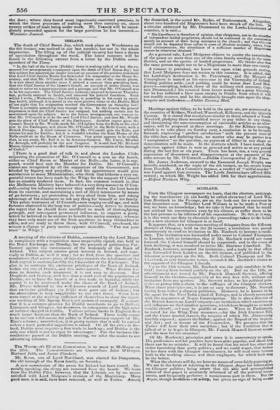IRELAND.
The death of Chief Baron Joy, which took place at Woodstown on the 6th instant, was noticed in our last number, but not in the whole impression. The filling up of the judicial vacancy has been a theme of speculation throughout the week. The latest rumours will be found in the following extract from a letter by the Dublin corre. spondent of the Times.
" In the hall of the Courts (Dublin) there is nothing talked of but the ru- rooured 1,11V arrangements consequent upon the death of Chief Baron Joy; but this subject has assumekfar deeper interest on account of the positive statement that Lord Chief Justice Bushe has forwarded his tesignation to the Home Se- cretary, and that Mr. O'Connell is likely to obtain one of the vacant places. It is now about three months since I noticed a rumour then prevailing here, that the Chief Justice of the Queen's Bench, on account of severe illness, was about to retire on a superannuation and a peerage, and that Mr. O'Connell was to be his successor. The Chief Justice, however, returned to town on Thursday last, perfectly restored in health, and resumed his judicial functions. Even whilst I write, (Wednesday,) his Lordship is presiding in his court in excel- lent health' although it is stated in the most positive terms in the Dublin Mail of last night that his resignation reached the Government on Saturday List! There is certainly something very strange in this. In the Courts the general impression is that the Chief Justice has resigned, but nothing certain can be ascertained upon the subject. As to the future arrangements, one rumour is. that Mr. O'Connell is to be the new Lord Chief Justice, and that Mr. Woulfe gets the place of Chief Baron of the Exchequer. Another leport gives the Queen's Bench to Mr. Woulfe, send. Mr. O'Lughlen from the Rolls to the chief seat in the Exchequer, and places Mr. O'Connell in the Rolls' Court, with a British Peerage. A third rumour is, that Mr. O'Connell gets the Rolls and retains his seat for Dublin ; but it is doubtful whether the Irish Master of the Rolls could sit in the House of Commons. One point appears to be settled, that, in any event, Mr. Ball is to be Attorney-General. Mr. Curry, Member for Armagh, will probably be the new ._.ergearit. It is said that Mr. Richard iloore, Queen's counsel, is to offer himself fur the representation of the borough of Cashel."
(There is a good deal of talk in and about the London Clubs respecting the promotion of Mr. O'Connell to a seat on the bench, either RS Chief Baron or Master of the Rolls—the latter, it is sup- posed, would best suit the Member for Dublin. Mr. O'Connell's claims are recognized by all the supporters of the Government, not blinded by bigotry and prejudice ; and his appointment would give satisfaction to many Ministerialists, who think that hitherto a very un- grateful return has been made by the Whigs for the support O'Connell Las so steadily rendered them. In fact, the common remark is, that the Melbourne Ministry have behaved in a very dirty manner to O' Con. nell—using his influence whenever they could derive the least benefit from its exercise, and maintaining a sort of illicit intercourse by means of go.betweens ; yet pretending to keep aloof from him, and taking advantage of his reluctance to ask any thing for himself or his family. 'This paltry treatment of O'Connell—now verging on old age, and with fortunes shattered in the long war of politics—only Aerves to increase the regret that lie should have sacrificed so much of thoroughgoing principle, and consequent permanent influence, to support a party, which he believed to be anxious to benefit his native country ; whereas they have may made use of the Irish questions to keep themselves in office, and are ready to throw them, with O'Connell, overboard, the minute a change in party tactics appears desirable. "Put not your trust" in Whigs.)


























 Previous page
Previous page